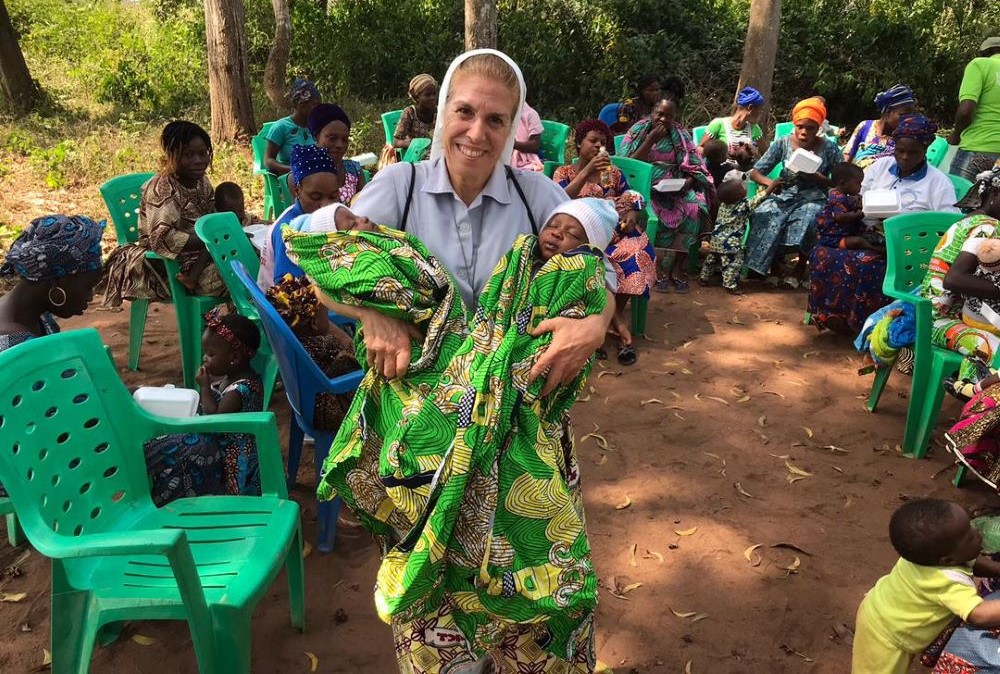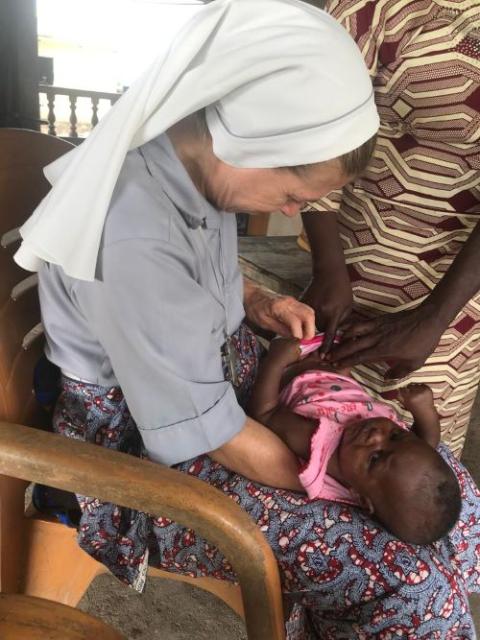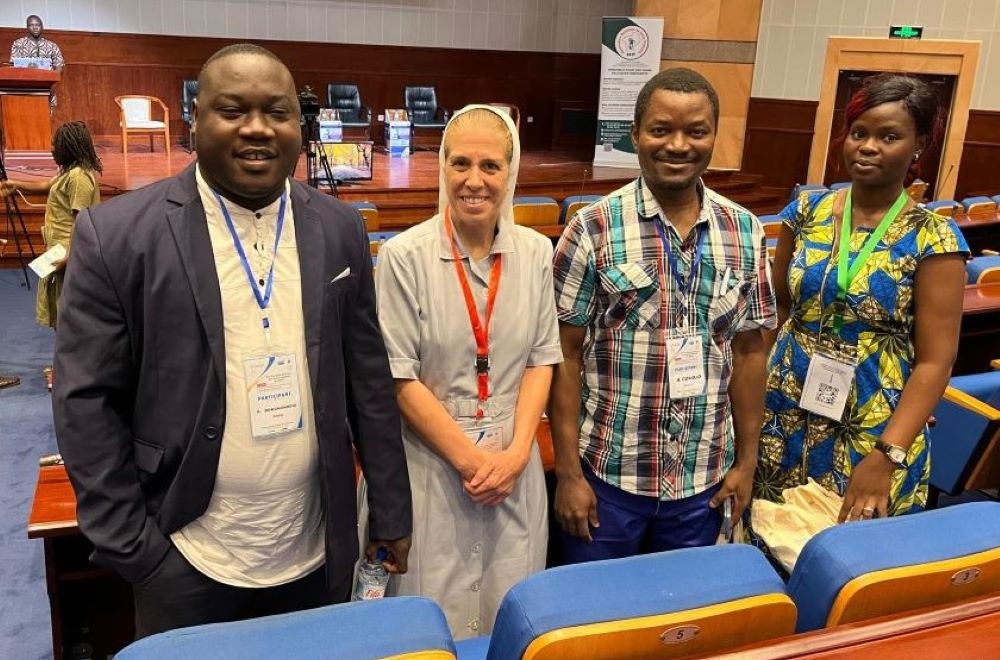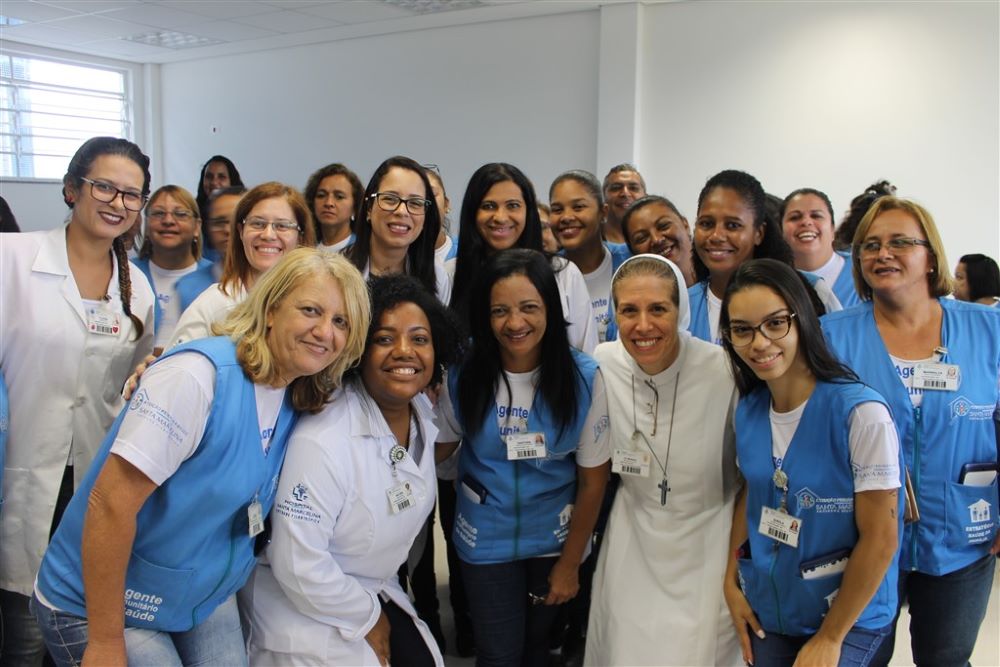
Sr. Monique Bourget holds healthy twins that she accompanied throughout pregnancy and delivery at a gathering of families in Benin. In Benin, she helps coordinate medical missions from Brazil, Canada and Italy. (Courtesy of Monique Bourget)
Sr. Monique Bourget is a member of the Sisters of St. Marcelina. The congregation was founded in 1838 in Cernusco sul Naviglio (Milan) by Luigi Biraghi, who chose girls' education as its apostleship.
The order encourages its members to have a profession in addition to their religious vocation, so Bourget pursued an education in medicine. She graduated from McGill University Medical School with a master's in epidemiology and a doctorate in public health.
Her call to touch the lives of the poor happened when she was an adolescent on a mission trip in Guatemala. She was ministering with a Capuchin sister to families who lived in extreme poverty when she encountered a little boy in the street wearing nothing but a ruined shirt.
"At that point, I knew what I wanted to do," she said. "I wanted to serve Christ and my brothers and sisters. And because I was living with the community, I thought that was a wonderful way to do it. So, the sisters brought me to their novitiate and their superior to chat."
When she returned from the trip, she decided to let her family know that she wanted to enter religious life. Bourget started McGill Medical School only 15 days before entering religious life and has been serving the poor since. Her work has brought her to serve in Brazil and Benin.

Sr. Monique Bourget examines a baby for malnourishment in Benin. As part of her pastoral work, she accompanies babies for their first 1,000 days to give them a better adulthood. She also gives them iron and folic acid. (Courtesy of Monique Bourget)
Under her leadership, Hospital Santa Marcelina in Brazil opened more than 100 health stations and helped open another medical school in São Paulo. Presently, she works full time in Benin to help coordinate medical missions from Brazil, Canada and Italy. She is also a pillar of the Bourget Foundation, which provides medical aid in Africa and Brazil.
Bourget spoke recently with Global Sisters Report.
GSR: As a Sister of St. Marcelina, what led you to become a doctor instead of another profession?
Bourget: Our founder, Luigi Biraghi, was a man of profound intelligence, believing that education is a means of accessing God and eternity and Christianizing society, especially through women. My vocation as a physician came from a love of helping my brothers and sisters who suffer in their bodies and souls and through a series of signs and opportunities that led me on this path.

Sr. Monique Bourget and her team participated in the 2024 National Congress for Palliative Care (2024) at the Palais des Congrès in Cotonou, Benin. (Courtesy of Monique Bourget)
Advertisement
What countries did your profession bring you to serve, and for how long?
Because my congregation does not work in the health field in Canada and there was a need in Brazil, I was called to work in Brazil for 25 years, six months after my family medicine residency. Then, in the transfer months to Benin in 2020, I ended up working for a health brigade in the combat of COVID-19 in Montreal for three months. For the last four years, I have been working in Benin in pastoral work in the implementation of a palliative care unit in a confessional hospital of the Camilian fathers.
What did you notice about the health care system in Brazil when you first arrived? What were the needs of the local people?
In Brazil, universal health care coverage started in 1988, only six years before my arrival (in 1994), so there was a lot of organization and networking to do. I believe I came at the right time, the right place and with the right people. I had just been trained as a family doctor in Canada, a country seen as a real model for health care 30 years ago. Brazil had just published a new resolution to organize primary health care based on the implementation of family health care teams. My congregation was called to implement the first family health care teams in a large city and serve as a model for the rest of the country.
It was a unique opportunity for me as we started everything almost from scratch. We hired the first 27 teams composed of a family physician, a nurse, two auxiliary nurses, and five community health care agents per team. As a small coordination team, a physician from the state, a nurse and me, we had to select the teams, organize the nine units where they would work, build the protocols, etc. It was a challenging moment but very rewarding and successful because after six months, the government expanded the program with many other teams, and 25 years later, the large city of São Paulo had more than 1,000 teams. They also developed other complementary activities I was involved in, such as dental health, mental health and specialty units, as well as walk-in clinics and emergency units open 24 hours a day.
You helped open Hospital Santa Marcelina in 1998 in São Paulo. How did this project come about? Who helped you launch and support this?
As the government was developing primary health care and the family health care teams, it was opening secondary care hospitals since there was a lack of hospital beds in various regions of the city. Because my congregation had a big teaching hospital in São Paulo and it had started the family health care program, they entrusted the management of a newly built 264-bed secondary hospital to the sisters. I became the first technical (medical) director of the hospital and was able to propose many changes that would help humanize the care of the patients, such as in the maternity ward and the psychiatry unit. We opened the visiting hours and made a stronger link with the community.

Sr. Monique Bourget stands with one of the units she was coordinating with health care agents in Brazil. (Courtesy of Monique Bourget)
What was the impact of your work on the people of Brazil when you left for your next mission?
In Brazil, I promoted the expansion of the family medicine specialty through many processes and became the first family medicine specialist to be recognized in the country. The humanization of obstetrics was also important and had national repercussions, working side by side with a great friend obstetrician, Dr. Marcos Ymayo. Another contribution was stimulating a medical curriculum based on humanitarian values.
In 2020, you went to Benin, Africa, where you organized a parish-based program for support and education for pregnant women and babies in 12 parishes. Why did you feel inspired to do this, and how did you do this?
The pastoral work with pregnant ladies, young infants and children was inspired by the Brazilian experience of more than 35 years. It is based on [the] voluntary work of community agents who receive a short practical formation on key themes that have a great impact on the health of the population: breastfeeding for six months (exclusive) and partial up to two years; prevention of malaria and diarrhea; nutrition; nonviolence in the families; environmental health, etc.
Each agent accompanies 10-15 families. They also do a "life celebration," which consists of gathering all the families the agent accompanies, discussing a theme together, singing and praising the Lord. Once a month, there is a meeting with a facilitator and all the agents of the parish for continuing education and to accompany the work they do.
How was your experience in Africa different from Brazil?
The great difference between Benin and Brazil is that the government in Benin does not subsidize health care for its citizens. It is the responsibility of the population. This makes all the difference. Young babies die of malaria, pregnant ladies die giving birth because of malaria, and young adults die of hypertension and preventable diseases.
You received an honorary membership award from the Foundation for Advancing Family Medicine. How do you feel about your efforts being recognized by the foundation through this award?
I have been very privileged to receive a few honors, and I believe it is a way for me to testify that although I am a religious sister, God can use us as He believes, knowing what is best for me and the people around me. I give thanks for the opportunity to share how God has worked in my life and has used me in many ways.





